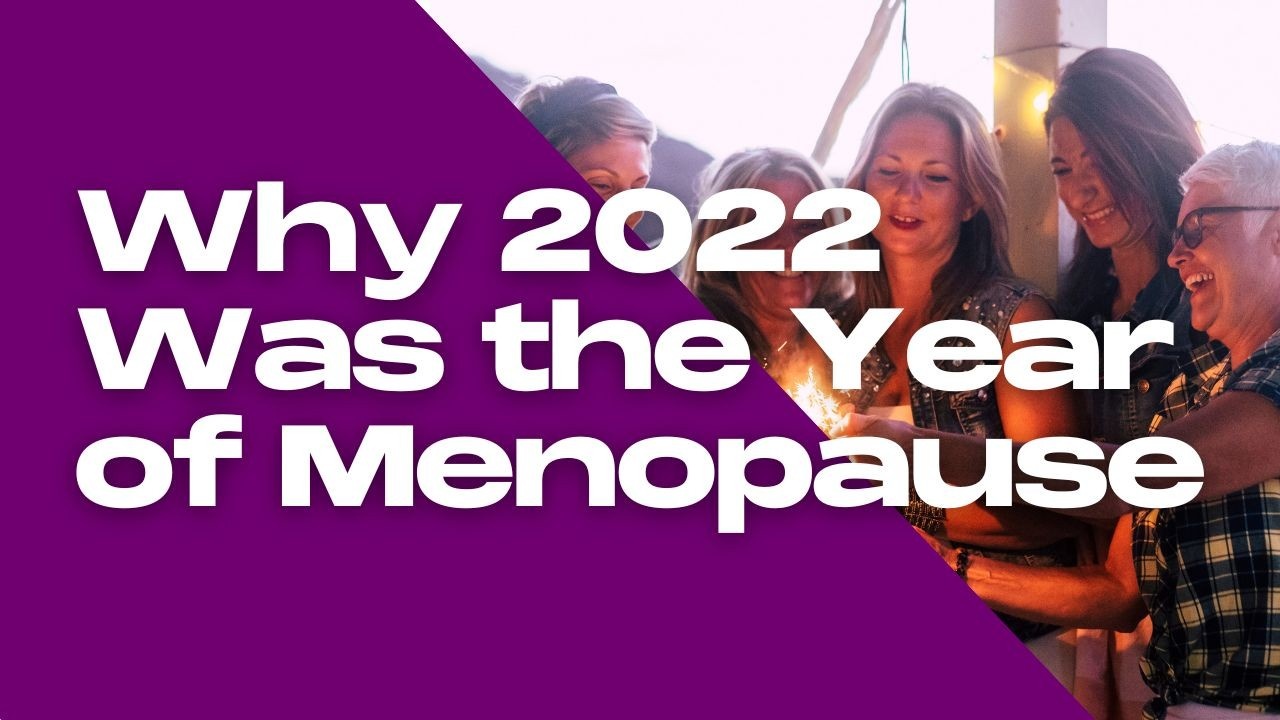
Why 2022 Was the Year of Menopause
Dec 19, 2022
It’s official, menopause has gone from sidelines to spotlight. Here are the promises and the pitfalls.
By Selene Yeager
If there was any doubt that 2022 was the “year of menopause,” Oprah Winfrey put a stamp on it earlier this month when she appeared on an episode of Paramount Plus’ The Checkup with Dr. David Agus (as seen in this clip from Access Hollywood) about how the mysterious heart palpitations she experienced during menopause made her feel like she was going to die.
“I have journals filled with: ‘I don’t know if I’ll make it until the morning,’”’ she told Maria Shriver, who was also on the show, reported here at 7news.com.au. “I thought I was going to die every night.” But nobody in her medical team could help her get to the root cause. Her cardiologist went as far as putting a catheter through her artery into her heart to no avail.
This isn’t the first time the media mogul has talked about menopause or her related heart palpitations. She wrote about it in 2019 in Oprah Daily, writing: “For two years I didn’t sleep well. Never a full night. No peace. Restlessness and heart palpitations were my steady companions at nightfall. This was back when I was 48 to 50. I went to see a cardiologist. Took medication. Wore a heart monitor for weeks.”
In that same piece, she laments that at 53 she struggled with how much difficulty she was having concentrating. Reading, which she’d always loved, had become “a chore.” And she lost her mojo, noting that her “whole world dulled down a couple of notches.” Her doctors never suggested any of this could be menopause. (She would eventually go on bioidentical hormone therapy, which she’s called a “miracle.”)
Following her appearance on The Checkup, the internet lit up like a thousand hot flashes. Many women were grateful. Some, however, responded with cynicism. Oprah is 68. Where was she with all this 10 years ago? Is she just looking to cash in? After all, the global menopause market was valued at 16.1 billion dollars (US) in 2022 and is expected to be a 24.4 billion dollar market by 2030.
I’m less cynical. When you take something like menopause, which has been largely ignored and stigmatized for decades, even the richest woman in the world can have her symptoms misunderstood and be silent. And to be fair, her magazine has been addressing it for many years.
Having her voice right now along with other high-profile women, including Michelle Obama, Emma Thompson, Naomi Watts, Salma Hayek, Gillian Anderson, Angelina Jolie, and Maria Shriver calling for more awareness of menopause and it’s wide sweeping range of symptoms and potential health consequences is important because that’s how menopause ultimately becomes normalized.
Having menopause moved into the mainstream spotlight simply holds a lot of promise, including:
Menopause gets more research money. NAMS annual meeting was jam-packed with nearly four days of research on vasomotor symptoms (i.e. hot flashes and night sweats), bone health, cardiovascular health, menopausal hormone therapy, pharmaceutical therapies, and much more. Heck, even National Geographic picked up some of the cutting-edge science that was presented on new non-hormonal drugs like fezolinetant that promise to treat hot flashes at their source — neurons in the hypothalamus in the brain. (Stay tuned to this blog for more on these drugs, called KNDy [pronounced candy] neuron modulators as they work their way through the regulatory pipeline.) More awareness means more research, which is better for all of us.
More care options. Though it’s sure to change, resident physicians traditionally haven’t gotten training in menopause, and that includes those in ob/gyn programs! One study found fewer than 7% of resident physicians surveyed felt adequately prepared to manage women experiencing menopause. That means it may be difficult to find a menopause-informed doctor where you live. The good news is that as awareness has increased, so have care options. If you have an internet connection, you can find a medical menopause provider through online services such as Gennev.com, elektrahealth.com, evernow.com, onstella.com, and wellfemme.com (not all of these are available outside of the US, UK, and/or Australia).

Menopause support in the workplace. More outlets are talking about how to support menopausal women in the workplace, which is far overdue, as NAMS Medical Director Dr. Stephanie Faubion explained during episode 101 of Hit Play Not Pause, noting that we are where we were with pregnancy 30 years ago. The increasing awareness and open discussion should accelerate this process and bring our workplaces up to speed.
Earlier interventions. We hear from many of you who, like Oprah, struggled for years to get the medical help you needed when you were suffering with menopausal symptoms that were wrecking your quality of life and/or your health. Though progress is bound to be uneven, more menopausal awareness should help more women get the help they need when they need it.
Potential Menopause-Related Pitfalls
Nothing is without both pros and cons, and menopause awareness is no exception. Though the pros far outweigh the cons, there are some pitfalls we all need to watch for:
Polarized thinking. As people shine more light on the myriad symptoms that women can experience through and beyond the menopause transition, we run the risk of looking at menopause as a “disease” rather than a biologically natural process. That narrative erases some of our agency and can make us all feel like we need medical intervention. On the flip side, the pushback to that narrative can include women resisting medical intervention when it could make their lives exponentially better.
Women all go through this process differently. Some have their lives and well-being thoroughly upended. Others move through smoothly. Many fall somewhere in between. There are many tools available to help, including exercise, nutrition, stress-management, cognitive behavioral therapy, menopausal hormone therapy (MHT, or HRT), adaptogens, and non-hormonal pharmaceuticals. Each woman’s journey should ultimately be as individual as she is.
Predatory marketing. Now that we’re a ginormous demographic, we will be the target of unscrupulous, predatory companies that want a piece of the menopause market. Feisty Menopause friend Amanda Thebe (who shared her menopause experience with us on episode 7 of Hit Play Not Pause) is the queen at calling out this bullshit. The bottom line is the usual rules of life apply: if something sounds too good to be true, it generally is.
Get Feisty 40+ in Your Inbox
We hate SPAM. We will never sell your information, for any reason or send you emails that suck!


